|
|
|
Sort Order |
|
|
|
Items / Page
|
|
|
|
|
|
|
| Srl | Item |
| 1 |
ID:
175814
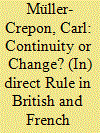

|
|
|
|
|
| Summary/Abstract |
Current political order in Africa is often linked to legacies of colonialism, in particular to legacies of indirect colonial rule. However, evidence about the application of indirect rule is scarce. In this paper I argue that empire-level characteristics interacted with precolonial institutions in shaping the indirectness of local rule. First, British governments ruled more indirectly than French administrations, which followed a comparatively centralized administrative blueprint, came with a transformative republican ideology, and had more administrative resources. Empirically, I find that French colonization led to the demise of the lines of succession of seven out of ten precolonial polities, twice as many as under British rule. Second, precolonial centralization was a crucial prerequisite for indirect rule. Local administrative data from eight British colonies show that British colonizers employed less administrative effort and devolved more power to native authorities where centralized institutions existed. Such a pattern did not exist in French colonies. Together, these findings improve our understanding of the long-term effects of precolonial institutions and draw attention to the interaction of characteristics of dominant and subordinate units in shaping local governance arrangements.
|
|
|
|
|
|
|
|
|
|
|
|
|
|
|
|
| 2 |
ID:
185604
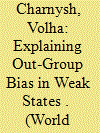

|
|
|
|
|
| Summary/Abstract |
Two dominant explanations for ethnic bias in distributional outcomes are electoral incentives and out-group prejudice. This article proposes a novel and complementary explanation for the phenomenon: variation in legibility across ethnic groups. The author argues that states will allocate fewer resources to groups from which they cannot gather accurate information or collect taxes. The argument is supported by original data on state aid from the 1891/1892 famine in the Russian Empire. Qualitative and quantitative analyses show that districts with a larger Muslim population experienced higher famine mortality and received less generous public assistance. The Muslims, historically ruled via religious intermediaries, were less legible to state officials and generated lower fiscal revenues. State officials could not count on the repayment of food loans or collect tax arrears from Muslim communes, so they were more likely to withhold aid. State relief did not vary with the presence of other minorities that were more legible and generated more revenue.
|
|
|
|
|
|
|
|
|
|
|
|
|
|
|
|
| 3 |
ID:
080697
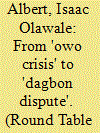

|
|
|
|
|
| Publication |
2008.
|
| Summary/Abstract |
The politicization and manipulation of traditional chieftaincy which begun under colonial rule was increased by military and civilian regimes in independent Ghana and Nigeria. The intrusion of national politics resulted in an escalation of chieftaincy disputes leading to loss of life and destruction of property. This process is illustrated by the Owo crisis in Ondo State Nigeria and the Dagbon kingdom dispute in Northern Ghana.
|
|
|
|
|
|
|
|
|
|
|
|
|
|
|
|
| 4 |
ID:
110221
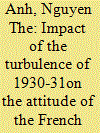

|
|
|
|
|
| Publication |
2011.
|
| Summary/Abstract |
The 1930-31 revolutionary outburst in Vietnam convinced the French administration that it needed to revitalize the local monarchy and create a living institution with initiative in decisions and reforms that would satisfy the Vietnamese people's aspirations. The Vietnamese emperor, Bao Ðai, was taken back to the imperial capital of Huê and given the task of conciliating 'the millennial traditions and disciplines of the past, indispensable to public peace, with the requirements, advances and freedoms inseparable from modern activity'. Yet this attempt to boost the monarchy's prestige was short-lived because the French administration went no further than a few measures aimed at modernizing the mandarinal machinery. The French will to mould the country's social structures into a passive state of tranquillity thus satisfied no-one, and could not help to develop a conservative ideology attractive enough to avert a revolution on the left.
|
|
|
|
|
|
|
|
|
|
|
|
|
|
|
|
| 5 |
ID:
033196
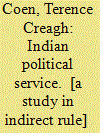

|
|
|
|
|
| Publication |
Bombay, Allied Publishers, 1971.
|
| Description |
x, 291p.hbk
|
|
|
|
|
|
|
|
|
|
|
|
Copies: C:1/I:0,R:0,Q:0
Circulation
| Accession# | Call# | Current Location | Status | Policy | Location |
| 007162 | 954.03/COE 007162 | Main | On Shelf | General | |
|
|
|
|
| 6 |
ID:
106331
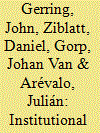

|
|
|
|
|
| Publication |
2011.
|
| Summary/Abstract |
Most governance arrangements involve spatial units with highly unequal powers, for example, a feudal monarchy and its principalities, an empire and its colonies, a formal empire and an informal empire (or sphere of influence), a national government and its subnational entities, or a regional government and its local entities. In this situation, the dominant unit (A) usually enjoys some discretion about how to institutionalize its authority over the subordinate unit (B). An important element of this decision concerns how much authority should be delegated to the weaker unit. The authors simplify this dimension of governance along a continuum of "direct" and "indirect" styles of rule. Why, in some cases, does one find a relatively direct (centralized) system of rule and in others a relatively indirect (decentralized) system of rule? While many factors impinge on this decision, the authors argue that an important and highly persistent factor is the prior level of centralization existing within the subordinate unit. Greater centralization in B is likely to lead to a more indirect form of rule between A and B, all other things being equal. The authors refer to this as an institutional theory of direct/indirect rule. Empirical analyses of this hypothesis are applied to patterns of direct and indirect rule (1) during the age of imperialism and (2) across contemporary nation-states. The article concludes by discussing applications of the theory in a variety of additional settings.
|
|
|
|
|
|
|
|
|
|
|
|
|
|
|
|
| 7 |
ID:
192248
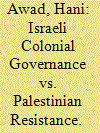

|
|
|
|
|
| Summary/Abstract |
This article examines the institutional genealogy of Israeli colonial governance (ICG) and the accompanying patterns of Palestinian resistance in the occupied West Bank and Gaza Strip. It argues that ICG has experienced three phases, each marked by a particular form of direct or indirect colonial rule. Each of these colonial rule forms has been resisted through a distinct pattern of centralized or decentralized collective political agency. I argue that both the form and governing logic of ICG are determined not only by colonialist aims, but also by their interplay with the Palestinian resistance.
|
|
|
|
|
|
|
|
|
|
|
|
|
|
|
|
| 8 |
ID:
086738
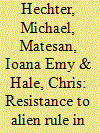

|
|
|
|
|
| Publication |
2009.
|
| Summary/Abstract |
Although alien rule is widely assumed to be illegitimate, nationalist resistance to it varies across time and space. This article explores why there was greater nationalist resistance to Japanese colonial rule in Korea than Taiwan from the turn of the twentieth century to the end of World War II. Resistance to alien rulers requires both a supply of participants in nationalist collective action and a demand for national self-determination. The article assesses two principal propositions: (1) that the supply of participants increases to the degree that native elites are stripped of their traditional authority and offered few incentives to collaborate; and (2) that the demand for national self-determination decreases to the degree that alien rule is fair and effective. A comparative analysis of the effects of Japanese alien rule in Taiwan and Korea suggests that nationalist resistance is greater in the earliest phases of occupation, that the greater native elites' opportunities, the weaker the resistance to alien rule; and that the fairer the governance, the weaker the resistance to alien rule.
|
|
|
|
|
|
|
|
|
|
|
|
|
|
|
|
| 9 |
ID:
191053
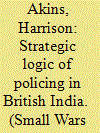

|
|
|
|
|
| Summary/Abstract |
Within British India, the police were used to suppress challenges to colonial authority. Yet, police actions in fulfilling this role varied by region. Within the provinces, the police were a coercive force to enforce internal security, augmenting military efforts. On the frontier, the aim of the police was to integrate locals into the local security framework and weld their interests to government control, rather than the direct application of force. Relying on Indian archival records, this comparative analysis demonstrates the importance of considering this variation for a more complete understanding of the strategic logic of colonial policing.
|
|
|
|
|
|
|
|
|
|
|
|
|
|
|
|
| 10 |
ID:
173263
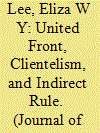

|
|
|
|
|
| Summary/Abstract |
United front organizations in Hong Kong have evolved into a form of patron-client network, with the Liaison Office of the Central People’s Government in the Hong Kong Special Administrative Region (Liaison Office) assuming the role of the patron. Possessing the capacity to penetrate into the community and offer patronage goods, these organizations have become the basis for the Liaison Office to build a political machine, discipline elites and maintain their cohesion, control the executive, and counterbalance civil society. The closely knit clientelist network functions as a para-party machinery, supporting the Liaison Office to operate as a quasi-ruling party. On the other hand, immense social resentment has culminated over the Chinese party-state’s (party-state’s) infringement on the autonomy of the Hong Kong Special Administrative Region (HKSAR).
|
|
|
|
|
|
|
|
|
|
|
|
|
|
|
|
|
|
|
|
|